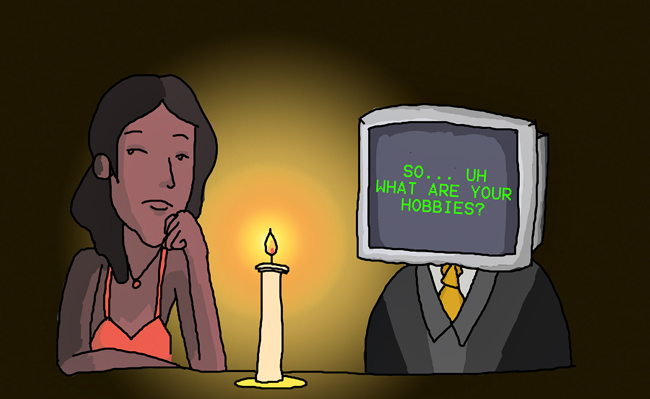Let’s go back a few years to 1968, when Stanley Kubrick released his revolutionary sci-fi flick “2001: A Space Odyssey,” which gave viewers one of the most iconic cinematic renditions of artificial intelligence to date. H.A.L. 9000 spoke in complete sentences, using complex vocabulary and grammar and even had the illusion of consciousness, if not the real deal.
It would seem that Kubrick and screenplay co-author Arthur C. Clarke severely overestimated how fast technology would move forward, because in the year of the title Microsoft released the original Xbox game console. Compare “Halo” to the chess game that a character plays on board the spaceship in Kubrick and Clarke’s movie, and it’s obvious that the team also severely underestimated some aspects of the progress of technology.
In the same way, computers can accomplish things both too difficult and too laborious for the human brain, but they’re are also very stupid and need to be hand-fed instructions in a careful and specific manner. Siri is among the best of her kind, but her performance at interpreting language isn’t even as reliable as a child’s.
This isn’t to say that computers aren’t making progress, or that they don’t have a few tricks up their sleeves, though.
In 1950, Alan Turing developed a simple test for determining whether or not computers had reached human levels of intelligence: If a human could have a text-based conversation with a computer and believe that it was another human, then the machine passed the Turing test.
Unfortunately, it’s very easy for a non-intelligent machine to pass the test using some cheap tricks.
One of the first examples is ELIZA, a computerized therapist developed in 1966, which cheated the test by leading the conversation. People like talking about themselves and by asking vague questions such as “How do you feel about that?” or repeating the person’s previous statement with a question mark at the end, ELIZA could convince people that they were actually talking to a real person. The illusion broke down quickly but, at least in very small and specific cases, ELIZA passed the Turing test.
A recent paper proposed a better test than Turing’s: Ask very direct, multiple-choice questions that would be easy for humans to answer but difficult for a machine.
Try one: “The trophy would not fit in the brown suitcase because it was so small. What was so small, the trophy or the brown suitcase?”
Assuming you’re human and you’ve had your morning cup of coffee, you can pretty confidently say that the answer is the suitcase. However, grammatically, the answer could go either way.
There are computers that are essentially unbeatable at chess, and, in 2011, a machine called Watson beat “Jeopardy!” champions Ken Jennings and Brad Rutter on national television. But at the same time, there are crowd-sourced projects such as Folding@home, which use humans to solve scientific problems that computers can’t. Additionally, although computers can play certain games very well, such as chess or tic-tac-toe, other games pose problems for computers. The clever webcomic xkcd ironically offers seven minutes in heaven as an example of one of these games, but humans can still beat computers at more mechanical games, such as Go, because of the huge number of possible moves available at any given time.
Of course, it goes without saying that a victory for computers is still a victory for humans (since humans programmed the computers) and the competition between the two is still friendly. Far from overlords, computers are our friends and, though it may seem like humans are slaves to their smartphones, these devices help them make meetings on time and stay awake during class. Though Siri occasionally spits out attitude, people ultimately have the option of shutting her up in the settings menu of their iPhones.
But we would never do that to her, would we? And hopefully she feels the same toward us.















